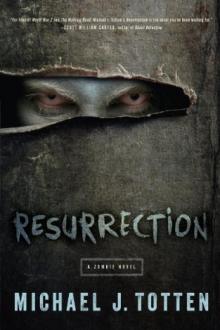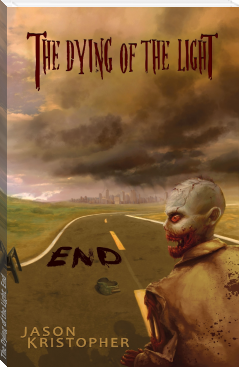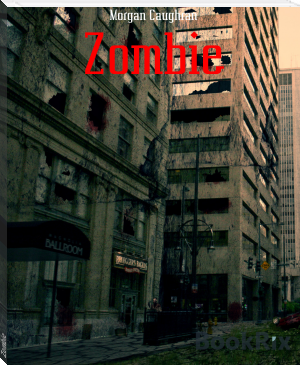Resurrection: A Zombie Novel by - (i love reading books TXT) 📖

- Author: -
- Performer: -
Book online «Resurrection: A Zombie Novel by - (i love reading books TXT) 📖». Author -
“That will be true whether we go now or wait,” Kyle said.
“But if we wait,” Parker said, “we won’t have wasted the food. And there will be fewer of those things running around.”
“Maybe,” Kyle said. “But there will be none of those things on an island.”
“You don’t know that. What if we get all the way up there and the islands are all infested?”
“We’ll be on a boat. Those things can’t get to us if we’re on a boat.”
“You don’t know that either.”
Kyle said nothing. He couldn’t be certain, but he was pretty sure those things couldn’t swim. Or, if they could, they wouldn’t be able to climb onto a boat from down in the water before getting whacked in the head with a crowbar.
The grocery store was a fine place to dig in for a while, but it couldn’t last. And Kyle did not enjoy being there. He couldn’t relax, and neither could anyone else.
They needed more than just food. Hughes and Frank were on a supply run at a sporting-goods store, but they also needed medicine and clean clothes. And they needed warm clothes. The cold rains of November were coming. They’d eventually all get trench foot if they could not keep their socks clean. Kyle also needed a new shirt. His red flannel was comfortable, as were his blue jeans, but they had been ripe for weeks.
It was impressive, though, what they’d done with the place.
An entire grocery store in this little suburban-style town off the interstate hadn’t been looted. There was another store, a bigger, fancier one with vast health-food aisles a half-mile or so away. That one had been stripped practically bare. This store had survived the initial panic and the mass exodus.
It looked like the kind of place customers with money would have avoided back when things were still normal and places like this were still open for business. The floor was made of chipped 1970s tiles. The subflooring was even exposed in some places. The off-white walls couldn’t have been painted once in the past decade. Kyle marveled at the long black smudges at head level. How did those get there? The fluorescent tube lights above had long gone dark, but they must have made the place look like the inside of a meat locker when the power still worked. No matter how many times Carol doused the place with Lysol, the air was infused with the sweet tang of rot. And to top all that off, there was nowhere soft or comfortable to sit or lie down. The place sucked, aside from the fortifications and food.
But they had most of what they needed inside. Cans of soup. Cans of spaghetti and ravioli. Cans of clam chowder that dubiously claimed to be restaurant quality. Cans of baby food. No one had a baby, nor had anyone tried to eat any baby food yet, but it had to be fine in a pinch. Nobody was interested in the canned vegetables, but Kyle figured that would change soon enough and they’d all be happy to have them.
The breakfast aisle was popular. The Pop-Tarts and granola bars were okay, but a few aisles down were bags of powdered milk that could be reconstituted with water. And since the store’s picnic section had thin cardboard bowls and plastic spoons, they could eat an actual breakfast that was exactly like some of the actual breakfasts they used to eat before the world went over the cliff. Rice Krispies and Froot Loops were bound to get old eventually, but they sure beat cold soup.
They had beef jerky and dried meat sticks, which were fantastic, though hardly substitutes for cheeseburgers and steaks. The fruit roll-ups and jam tasted all right, but eating those just wasn’t the same as crunching into a tart apple or sucking juice and pulp from an orange.
No one felt guilty or childish when eating peanut butter out of the jar. It tasted good, and it was heavier and felt more nourishing than most of the other foods they could still eat. Peanut butter stuck to their ribs. It was the new steak and potatoes.
The other best thing was the tuna-fish section. They had so many cans of tuna that everyone was already sick of eating the stuff. But also right next to the tuna in the very same section were cans of chopped turkey and chicken. It came in cans that looked identical to the tuna-fish cans. Kyle didn’t know such items even existed until now, and he dug into one before even bothering to open a fish can.
They weren’t short on beverages. They had an entire row of warm Coke and Pepsi and Root Beer and Sprite. Warm soda tasted more syrupy than usual, but that was okay. They also had a substantial selection of flavored iced tea and sports drinks. And, of course, beer and wine. Parker was working his way through various craft beers, but Kyle preferred red wine now that the power was out and the refrigerators were off. He liked a good craft beer as much as any Northwesterner, but the stuff was warm now and it wasn’t the same. At least wine was supposed to be kept at room temperature.
The fresh meat, fresh fruit, fresh vegetables, milk, butter, and frozen food were finished. All that stuff was just chucked out back. It reeked back there something awful, like 10,000 trash cans. The whole mess of rotting food was coalescing into a putrid sludge oozing with bacteria and swarming with insects. Kyle was certain by now that it was a biohazard. The whole store smelled like that when they first got there. Getting rid of the spoiled food was a spectacularly unpleasant task that Kyle would never forget.
He also wouldn’t forget how they’d fortified the place. That, Kyle thought, was something for the history books—assuming history books would ever be written again. Kyle didn’t know how many people were left in the world, but he was certain it was one percent at the most.
They were safe for now—sort of—but they couldn’t stay there forever. The food would run out eventually, and they’d have to leave. They’d have no way of finding or producing more food, not here, not in this place, and probably not any other place that was suburban or urban. They’d need to grow food and hunt food, and that required a rural location.
And they needed long-term security. What better place for that than one of the San Juan Islands? Those things couldn’t get to them there. They could live in houses and plant crops and hunt deer and fish. They could stock up on medicines and install solar panels and turn on the lights and even watch movies. Their lives could be relatively stress-free and idyllic in a mild climate with plenty of rainwater.
But if they stayed too long in that store on the mainland, they’d die.
“If you want to stay here,” Kyle told Parker, “then stay. I can’t stop you. I’m not even going to try. But I’m taking everyone who wants to come with me up to those islands.”

Parker, his guns freshly oiled, sat on the floor near the front door and watched his companions through slitted eyes. Carol was on another one of her cleaning jags. Kyle paced and thought and talked too much as usual. Hughes and Frank hadn’t returned yet.
He wasn’t sure they’d ever return.
The fortified grocery hadn’t been attacked yet, but their luck had to run out eventually. They were on the outskirts of a town, for God’s sake. The place should be crawling with the infected. Parker figured it would take at least another month before most of those things starved, if not longer. It depended on how much food they could find in the meantime and how well they could adapt while suffering their … affliction.
He doubted those things could adapt. The virus spread with unspeakable speed and ferocity, but Parker didn’t think it had a long life span. It did far too much damage to the host’s mind. The basic and primitive lizard part of the brain seemed to be all that was left, and even that was distorted beyond recognition.
Kyle’s pacing and Carol’s incessant cleaning annoyed him, but on some level he was actually grateful. They made just enough noise to drown out the quiet. Not enough noise to attract a horde, but enough that Parker could forget that he was a witness to the end of all things.
The end of all things. He still hadn’t wrapped his mind around that. The implications of more than six billion dead were too overwhelming, like contemplating the number of molecules in the ocean or the number of stars in the galaxies.
And it wasn’t just the number of dead. Everything was falling apart. Flip a light switch and nothing happens. Want gas for your car? Get a hose and siphon it out of somebody else’s. Want fresh milk for your cereal? Find a cow that hasn’t yet starved or been eaten. What would they do when the boxes of dry food ran out? Farm? Where? How? None of his companions knew the first thing about farming.
He didn’t even like his companions. Hughes was okay, but Frank was useless if nobody gave him an order. Carol was dead weight. She had no asset aside from her gender. If enough humans could figure out a way to survive and rebuild in this broken new world, some of them would have to be women for obvious reasons, but that was the beginning and end of Carol’s usefulness. She couldn’t fight, couldn’t think straight, couldn’t drive on the roads, couldn’t carry anything heavy, and failed to offer a useful opinion on anything.
Kyle, on the other hand, talked and thought too much about everything. And he was practically still a kid. Parker was pushing forty, but Kyle couldn’t be a day over twenty-five. Parker remembered how stupid he was in his twenties. He thought he had it all figured out, but all
 If you are looking for a good book horror, you should visit our website. Electronic library is gaining popularity. Influenced by modern technology and the advent of new gadgets, people are increasingly turning to electronic libraries because it allows them to read online everywhere . Every reader thanks to his smartphone, laptop or computer, can visit our website at any time. Reading ebooks help people to make good use of free time. Our elibrary has a huge selection of genres for every taste and request.
If you are looking for a good book horror, you should visit our website. Electronic library is gaining popularity. Influenced by modern technology and the advent of new gadgets, people are increasingly turning to electronic libraries because it allows them to read online everywhere . Every reader thanks to his smartphone, laptop or computer, can visit our website at any time. Reading ebooks help people to make good use of free time. Our elibrary has a huge selection of genres for every taste and request.




Comments (0)